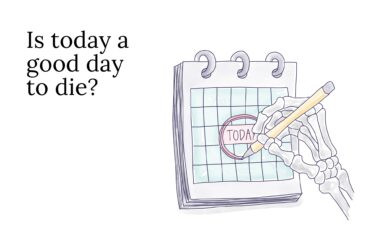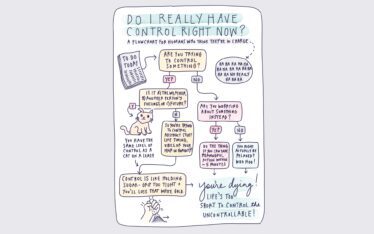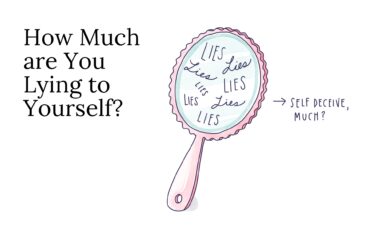When was the last time you had an epiphany—a moment of sudden and profound understanding, accompanied by a high-wattage lightbulb “ah-ha” moment (or at a least a flickering of the lamp in the corner)?
 Those of us interested in self-development tend to clamor for epiphanies. We’re willing to pay for them handsomely in time and money, because the intoxication of a new idea (especially about ourselves) is the best kind of drunk we can get. We go on retreats (sometimes even of the silent sort *gasp!*), we spill our guts to therapists and coaches, we transmute our thoughts into journals, we meditate, we read deeply moving and introspective books, we take psilocybin (okay I haven’t but you might), we do whatever it takes to peer through that window (or is it a mirror?) into our souls—longing for an insight that’ll help us make some meaning out of this weirdly finite existence, to live like we mean it for real this time.
Those of us interested in self-development tend to clamor for epiphanies. We’re willing to pay for them handsomely in time and money, because the intoxication of a new idea (especially about ourselves) is the best kind of drunk we can get. We go on retreats (sometimes even of the silent sort *gasp!*), we spill our guts to therapists and coaches, we transmute our thoughts into journals, we meditate, we read deeply moving and introspective books, we take psilocybin (okay I haven’t but you might), we do whatever it takes to peer through that window (or is it a mirror?) into our souls—longing for an insight that’ll help us make some meaning out of this weirdly finite existence, to live like we mean it for real this time.
I’ve written oodles of times about how near-death experiences or brushes with death can offer quintessential epiphanies, or what’s brainily known as “quantum changes” that lead to deep and lasting transformations of our perspectives, priorities and values. Researchers have described this profound subjective experience as a developmental metamorphosis, like a “fast-forward in what Maslow described as self-actualization.” We want the fast pass up Maslow’s pyramid, don’t we?
The question remains: how do we glean the benefits of near-death experiences without having to actually experience near-death—what with all its pesky risks and drawbacks? Noting the unfortunate effectiveness that traumatic events have on illuminating the value of life, psychologists challenge us to discover alternative paths to ah-ha moments. So how do we wake up in a new way… see our lives through fresh eyes… in the absence of adversity, trauma or loss?
You know I have an idea, and you likely know where this is going.
When we practice memento mori—the conscious act of remembering that we must die (*sigh*)—it can activate the epiphany mechanisms that so often occur from near death experiences.
Epiphanies or insights don’t always occur in gradual and linear patterns. Quite the opposite is true, as continuous change is often born out of what’s known as nonlinear dynamical systems theory—and before you nod off, let me just say it’s kind of like when we shake a snow globe and the bits of snow experience a whirlwind of disturbance and variability before settling. It’s a shitty reality but we often learn, change and develop as a result of destabilizing and nonlinear occurrences (yes—that’s post-traumatic growth 101).
Discontinuous and transformational change can be prompted in the face of dissonance in life—like after chronically dissatisfying events that culminate in what’s known as a “crystallization of discontent.” Repeated negative events or emotions (like an ongoingly-unhealthy personal relationship… a job that relentlessly stabs your soul… the conspicuous absence of hobbies in a work-filled life… or any other accumulation of miserable moments) can set the motivational wheels in motion for us to make life changes. Think of it like a rock-bottom-tipping-point-of-trash. Isn’t it true we need all that discontent to crystallize before the light goes off and we Do Something About It?
Learning from unusual and discrete events—like reflecting on the fact you’re going to die someday—can be transformational for us precisely because the act of reflecting on death is a non-routine experience. This kind of reflection can act as a jolt to our “business as usual” ways of living, and instigate a miniature crisis that provokes us to question what we believe to be true. Paradigm shifts can change how we see ourselves after engaging in the highly valuable act of critical self-reflection. By taking a disorienting dilemma (like divorce, retirement, death of a spouse, or an insight in the midst of death reflection), and critically reflecting on what it really means to us, we can benefit from transformative learning and then act on those ah-ha’s. Studies show that having “ah-ha” moments of insight leads to more accurate and quality-filled solutions to problems.
One of the most impressive consequences of anticipating death is that it motivates us to find meaning in life, take charge of our lives, and craft a plan for our lives. We gain new insights from these epiphanies that then activate motivation to take action. The more we can instigate or engineer the ah-ha with death awareness, the more likely we might be to engage in critical reflection, pursue intrinsic goals, and activate our approach systems towards living life more fully.
So yes, it’s possible to ignite an epiphany by thinking about your ephemerality. Check out the recent article I wrote in Psychology Today if you’re looking for additional ways to flick that lightbulb switch (that don’t happen to involve death—haha).
One last juicy nugget about inducing an epiphany… studies note that some of our best thoughts come to us when we’re about to nod off to sleep. So how about you go contemplate your ultimate demise (you’ve got just 4,000 Mondays in total, my friend!), have some ice cream (I added that one in because life’s too short to not have Ben & Jerry’s Cherry Garcia), and start to doze off. Eureka! Your best ideas and insights are just waiting for you as you start to drool.

P.S.: You Only Die Once: How to Make It to the End with No Regrets… it’s like 352 pages of epiphanies!
P.P.S.: Let’s do Instagram together?
P.P.P.S.: Oh and just in case you missed it… I’d love you forever if you took 16 minutes out of your life to watch my TEDx talk!






